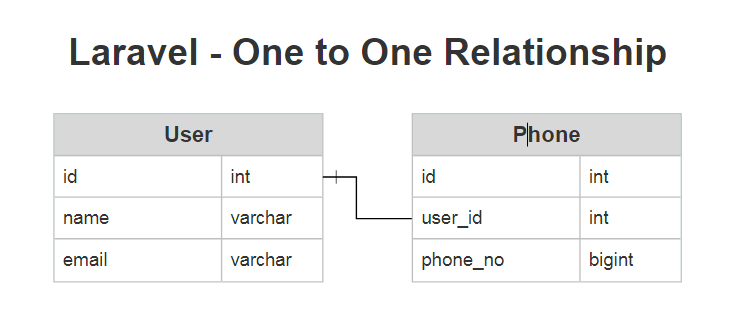Laravel 9 One To One Relationship Example
Websolutionstuff | Apr-01-2022 | Categories : Laravel
In this article, we will see laravel 9 one to one relationship example. Also, you can use one to one relationship in laravel 6 and laravel 7, and laravel 8. A one-to-one relationship is a very basic type of database relationship. You have one table with a primary key that references the id of the other table. For one to one relationships using hasOne and belongsTo method in the model for access to each other model.
So, let's see one to one relationship in laravel 9, laravel 9 eloquent relationships example, laravel 9 one to one relationship, one to one relationship laravel 9 example
Also, we will create migration with a foreign key, retrieve records using the model, insert new records, update records, etc.
We will create a User and Phone table. User model might be associated with one Phone model. To define this relationship, we will place a phone method on the User model. The phone method should call the hasOne method and return its result.

In this step, we have to create migration for users and phones table. we will also add a foreign key to the user's table.
Create Migration of Users Table
Schema::create('users', function (Blueprint $table) {
$table->increments('id');
$table->string('name');
$table->string('email')->unique();
$table->timestamps();
});
Create Migration of Phones Table with Foreign Key
Schema::create('phones', function (Blueprint $table) {
$table->increments('id');
$table->integer('user_id')->unsigned();
$table->string('phone_no');
$table->timestamps();
$table->foreign('user_id')->references('id')->on('users')->onDelete('cascade');
});
In the user model, we can create a phone() function and add the relation of the phone model using hasOne method.
User Model :
<?php
namespace App\Models;
use Illuminate\Database\Eloquent\Model;
class User extends Model
{
/**
* Get the phone associated with the user.
*/
public function phone()
{
return $this->hasOne(Phone::class);
}
}
Phone Model :
we can access the Phone model from our User model. Next, let's define a relationship on the Phone model that will let us access the user that owns the phone. We can define the inverse of a hasOne relationship using the belongsTo method.
<?php
namespace App\Models;
use Illuminate\Database\Eloquent\Model;
class Phone extends Model
{
/**
* Get the user that owns the phone.
*/
public function user()
{
return $this->belongsTo(User::class);
}
}
If the foreign key on the Phone model is not user_id, you may pass a custom key name as the second argument to the belongsTo method
public function user()
{
return $this->belongsTo(User::class, 'foreign_key');
}
Once the relationship is defined, we may retrieve the related record using Eloquent's dynamic properties. So, here we can use the User model with a phone function.
$phone = User::find(1)->phone;
$user = Phone::find(1)->user;
Now, we will add records to the phone table using the user model.
$user = User::find(1);
$phone = new Phone;
$phone->phone_no = '9876543210';
$user->phone()->save($phone);
$phone = Phone::find(1);
$user = User::find(1);
$phone->user()->associate($user)->save();
You might also like :
- Read Also : How To Create Dynamic Pie Chart In Laravel 9
- Read Also : How To Get Current User Location In Laravel 9
- Read Also : How to Integrate Razorpay Payment Gateway in Laravel
- Read Also : Stripe Payment Gateway Integration Example In Laravel 8
Recommended Post
Featured Post

Laravel 10 Composer-runtime-ap...
In this article, we will see laravel/framework[v10.0.0, ..., v10.0.3] require composer-runtime-api ^2.2 error fixed...
Mar-07-2023

How To Import Large CSV File I...
In this article, we will see how to import a large CSV file into the database using laravel 9. Here, we will learn&...
Sep-15-2022

How to Display Validation Erro...
Hey folks, are you ready to make your Laravel Vue.js application even more user-friendly by implementing validation erro...
Mar-08-2024

How To Disable Weekends In jQu...
In this tutorial, we will see how to disable weekend dates in jquery datepicker. In the date picker, the weeke...
Jun-27-2022